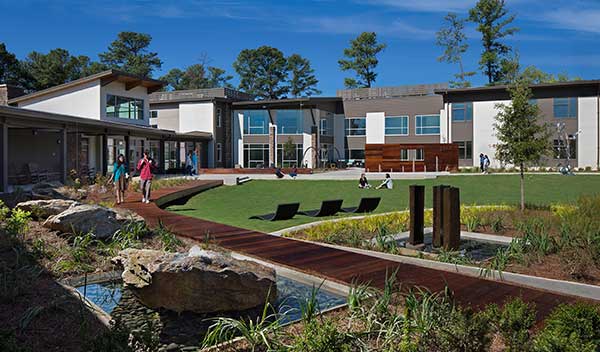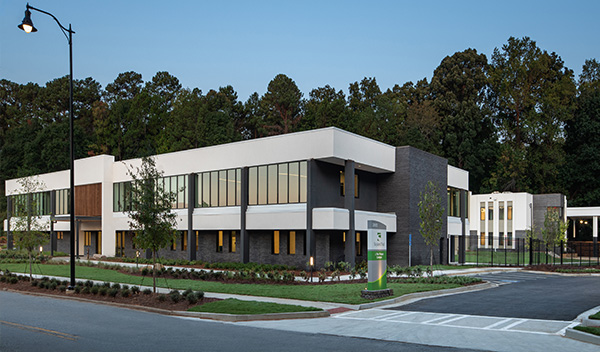Residential Mental Health Treatment Programs for Adults and Adolescents
Residential treatment usually is the best level of care for individuals leaving a hospital or locked psychiatric acute care facility. Licensed nurses and residential staff are onsite 24 hours a day.
Unlike a hospital, all of our residential communities in Atlanta, Georgia, are unlocked, voluntary facilities surrounded by gardens. Clients enjoy private bedrooms and bathrooms and participate in social activities on campus and out in the community. All of our residential facilities are licensed by the State of Georgia and accredited by The Joint Commission.
Adults Ages 18+
Adults ages 18 and older who admit to the residential treatment program typically stay in the residential level of care for 8 to 10 weeks before stepping down to day treatment.
Adolescents 14-17
Adolescents, teens ages 14 to 17, who admit to the residential treatment program typically stay at the residential level of care for 12 weeks before stepping down to day treatment.
Mental health residential treatment centers provide 24/7 support. Patients live on campus for a limited period of time while participating in a therapeutic mental health treatment program.
Mental health residential treatment programs give clients the time, space, and support they need to recover from an episode of mental illness. Clients learn how to manage their diagnoses and acquire skills needed to stay healthy.
Patients ofter enroll in a residential mental health treatment program after one or more hospitalizations in acute care facilities.
Residential treatment often is appropriate for people who have experienced one or more hospitalizations due to mental health symptoms.
Residential treatment may also be appropriate for people experiencing high levels of disability as a result of their mental health symptoms. They likely are unable to participate in school or work. They often have lost interest in or are avoiding relationships or activities they used to enjoy. They may have trouble managing their living space or personal hygiene.
Residential treatment often is appropriate for people experiencing symptoms of psychosis, mania, or suicide ideation who do not meet criteria for hospitalization.
If you think you or someone you love may benefit from residential treatment, the best next step is to schedule a psychiatric assessment with a mental health professional.
Both inpatient mental health treatment and residential mental health treatment provide 24/7 care.
Inpatient mental health treatment, or acute treatment centers, typically are hospitals. Patients are admitted for a short period of time to stabilize after a crisis. Acute centers often are locked facilities, and patients may be admitted involuntarily if they are in danger of harming themselves or others.
Patients typically admit to a residential treatment center voluntarily. Residential mental health centers usually are unlocked facilities. Residential programs offer a longer length of stay to help patients understand their disorder, find an effective medication strategy, learn new skills to stay healthy. The goals of residential treatment are to help patients learn to successfully manage their mental health disorders long-term, avoid a cycle of crises and hospitalizations, and live as independently as possible in the community.
Sometimes the terms "residential treatment center" and "mental health rehab" are used interchangeably. Rehab more commonly refers to a residential program focused on treating substance use disorders. Residential treatment center, or RTC, more often refers to programs focused on psychiatric disorders like mood, thought, anxiety, trauma-related, or eating disorders.
The Skyland Trail dual diagnosis program for adults treats individuals with mood and thought disorders AND substance use disorder.
RTC stands for residential treatment center. A residential treatment center is a level of mental health care in between inpatient hospitals and outpatient day treatment. RTC patients live onsite and receive 24/7 support.
As a behavioral health treatment facility, Skyland Trail offers residential treatment as the most intensive level of care. Clients typically step down from 24/7 residential care to our day treatment (PHP) program.
Mental health residential treatment centers typically offer a longer length of stay than a hospital or inpatient facility and are considered long-term mental health facilities.
The typical length of stay at the Skyland Trail mental health residential treatment program is about 2 to 3 months.
Skyland Trail is a long-term mental health facility in Georgia offereing residential treatment.
The goal of residential treatment programs is recovery. Clients learn skills to manage their disorders. Long-term residential mental health programs prepare patients to leave treatment and return home to their families, communities, and productive futures.
Adult Programs
The residential treatment program for adults offers inpatient 24/7 mental health care for adults of all genders. Patients reside in private rooms with private bathrooms.
Skyland Trail offers more than 125 groups each week. Most groups include clients of all gender identities. Some groups are more specialized. For example, weekly schedules include mens group, womens group, or LGBTQ peer support.
Skyland Trail is a welcoming and supportive inpatient treatment program for women, as well as a welcoming and supportive residential treatment program for men. And learn more about our welcoming community for clients who identify as transgender or gender nonbinary here.
Adolescent Programs
With private bedrooms and private bathrooms, our adolescent residential treatment program in Georgia is a welcoming and effective inpatient treatment program for female teens, a welcoming residential treatment program for male teens, and a top mental health treatment center for teens who identify as transgender or gender nonbinary.
Learn more about our 12-week long-term adolescent residential treatment program.


